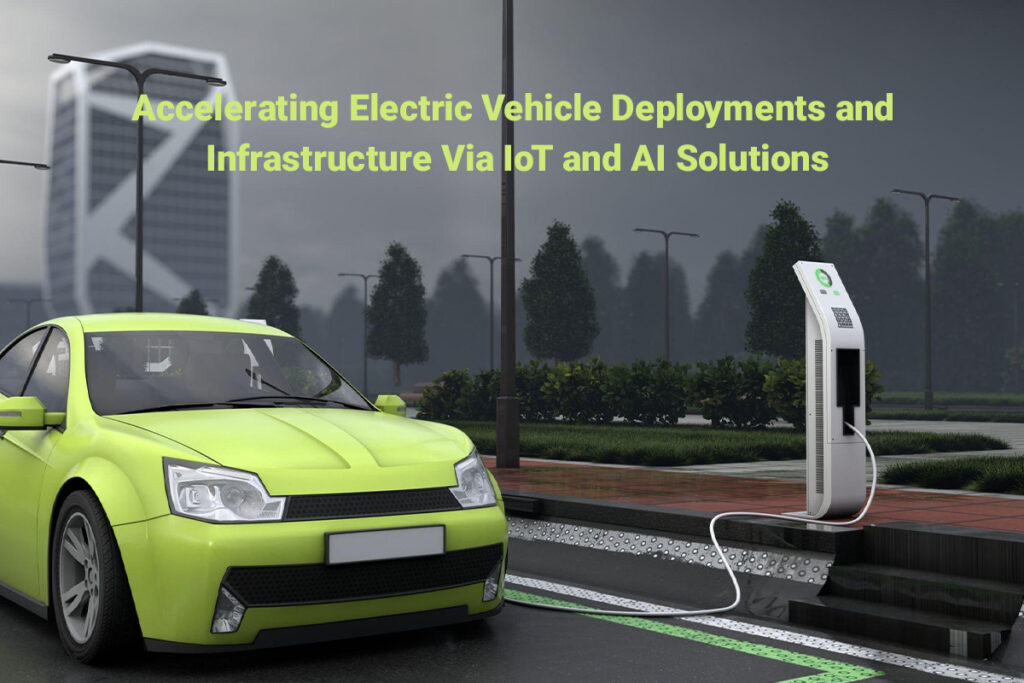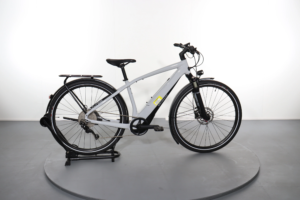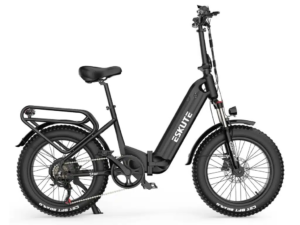Accelerating Electric Vehicle Deployments and Infrastructure Via IoT and AI Solutions.

What Is the EV Market?
Automobile manufacturers and businesses involved in EV production and sales must ensure that their customers have the best experience possible when using EVs on the road. The electric vehicle market is growing rapidly, so it’s crucial to make sure that customers experience positive results when using EVs.
IoT and AI solutions can assist them in finding the optimal routes between their home and their workplace (and vice versa), monitoring how much energy they use at any given time, and determining whether or not they’re driving safely with the help of sensors on board their vehicles. In addition to identifying problems with brakes and batteries before they occur, the software can also identify problems with other components.
Due to rising oil production costs, importing oil is becoming increasingly expensive. Countries that rely primarily on oil imports have to invest substantial amounts, creating economic pressure. Due to their battery, electricity, and fuel cell power, electric vehicles are less dependent on foreign oil, which will encourage their adoption during the forecast period.
A German automotive manufacturer, Volkswagen AG, transformed its Zwickau plant into EV production on 27 January 2022. The conversion marks the first time in history that a large-scale factory has switched from internal combustion engines to electric vehicles. Based on a modular electric drive matrix (MEB), six models from Audi, Volkswagen, and CUPRA will be manufactured in Zwickau.
As a strategic partner and shareholder of IONITY, the world’s leading high power charging network, Hyundai Motor Groups affiliated with Hyundai Motor Company, a South Korean automaker, was announced on 5 November 2020. By partnering with this company, high power charging will be boosted along European highways and zero-emission mobility will be promoted.
A joint venture agreement for the development of commercial BEVs and electric units was signed by BYD Auto Industry Co Ltd, affiliated with the China-based BYD Auto Co Ltd on 21 October 2020. Hino Motor Ltd, a Japanese vehicle manufacturer, is a Japanese vehicle manufacturer.
Benefits of EV In 2022
- With IoT, you can gain more insight into your car’s health, location, and temperature, letting you know when to replace the battery and increase performance. With IoT, you can also monitor how your vehicle is doing, and find out when it needs to be serviced. It is much easier to maintain your car’s battery life when you have more data about its performance, with IoT, you can monitor your vehicle’s location, temperature, and health. This information is used to replace the battery and improve the car’s efficiency.
- Electric vehicle owners need to pay attention to how much energy they use while charging their vehicles. Smarter charging is one of the biggest parts of owning one. The IoT solutions let you monitor how much energy your car consumes at home or work with real-time feedback to keep your bills down.
- If you’re concerned about keeping your car in control during inclement weather conditions (like rain), you need to monitor the weather conditions around you constantly to maintain safety while driving. Especially on bad weather days, when visibility is low or if there is fog or black ice on the road ahead, you should be aware of these dangers. You can stay safe by monitoring the weather conditions around you through IoT solutions and knowing when to slow down or speed up based on what’s going on outdoors.
Recent Developments in the EV Market
An automobile manufacturer based in Germany, Volkswagen AG, transformed its Zwickau plant into an electric vehicle production facility on 27 January 2022. In its history, it is the first large-scale factory to switch from internal combustion engines to electric vehicles. The Modular Electric Drive Matrix (MEB) will be used to manufacture six models from Audi, Volkswagen, and CUPRA in Zwickau.
As of 5 November 2020, Hyundai Motor Groups affiliated with Hyundai Motor Company, an automotive manufacturer based in South Korea, will become a strategic partner and shareholder of IONITY, the leading high power charging network in Europe. With this joint venture, high-power charging will be boosted along Europe’s highways and zero-emission mobility will be promoted.
BYD Auto Industry Co Ltd, an affiliate company of BYD Auto Co Ltd, a Chinese automotive company, signed a joint venture agreement with Hino Motor Ltd, a Japanese car manufacturer, on 21 October 2020, in order to establish a new company focusing on the development of commercial battery electric vehicles and electric vehicles.
Conclusion
Automobile manufacturers and other businesses involved in the sales and production of EVs should make sure that their customers get the best experience on the road when using their products. In order to accomplish this, they can rely on IoT and AI solutions, which can help drivers find the best routes between their homes and their offices (and vice versa), monitor the amount of energy they are using at any given time, and decide whether they are driving safely based on data collected from on-board sensors. It can detect brake or battery problems before they occur and more with data collected from sensors onboard their vehicles.
It is becoming increasingly expensive for oil to be produced, which increases the cost of importing it, and countries that rely heavily on oil imports must make substantial investments, putting economic pressure on them. Electric vehicles are powered by batteries, electricity, and fuel cells, which reduces dependence on foreign oil. This factor will drive adoption during the forecast period of electric vehicles.
Autonomous fleets can reduce total ownership costs by 53 percent from an economic point of view. In the future, as autonomous vehicles mature, fleet operators will not only be able to monitor the chances of things going wrong as they drive, but they will also be able to inspect their vehicles proactively before they go out on their next shift. The combination of IoT and AI technology holds great promise for electric vehicle adoption, as companies and industries across the globe are already working on ways to maximize its potential. This can lead to rapid deployment of electric vehicles and enhance customer satisfaction.


